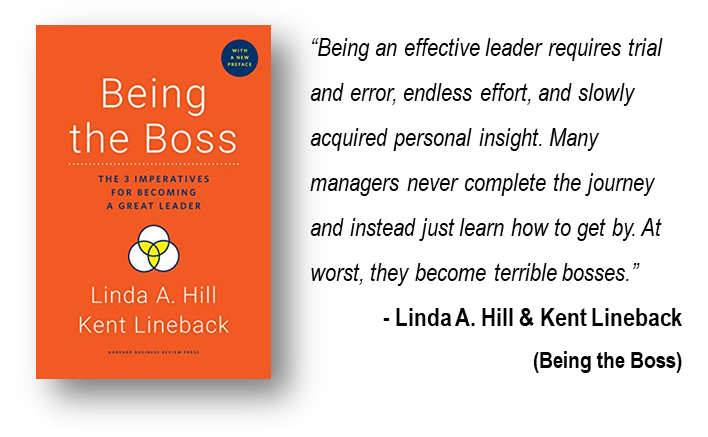“Are you the boss you need to be?”
If your answer is yes, then congratulations! And if your answer is no, then you are not alone!
This Good Friday weekend, I managed to spend some time on learning by flipping through the pages of “Being the Boss” by Harvard Business School Professor Linda A. Hill and management coach Kent Lineback. Being in the managerial and leadership role for almost a decade now at different workplaces, I’ve been fortunate to work with bosses who made me better and helped me learn more about the business. This book is a refreshing read for current and future managers, and leaders like me who want to take a pause and discover where we are on our own journey.
At the beginning, the authors Linda and Kent beautifully describe on how they teamed together, created synergies through their research and experience while writing this book. The book traverses through each imperative with assessment and familiar experiences, complexities and situations, we face at workplace.
The book’s title hits the bulls-eye with a clear message – The 3 imperatives for becoming a great leader. The book attempts to take a simple linear approach. When we think of being a good boss, we’d start thinking about our team. But the authors have deliberately taken a step here to put how leaders should manage their network in the organisation and prior to that, managing yourself.
Imperative 1: Focus on building one-on-one relationship with people you formally control: Manage yourself
The four chapters in this section explore a leaders’ ability to influence his team on three premises: Trust, Authority and Relationships. As I read through this section and different chapters, I was able to reflect and relate some questions posed in each chapter in my own work style, my ability to influence people, peers and superiors.
Three key ‘one-liner’ takeaways from this section:
- Influence over authority always wins
- Being a boss and being a friend is incompatible
- Competence and Character are two pillars of trust
Imperative 2: Focus on nurturing relationships with all others you need but don’t control: Manage your network
The three chapters takes us deeper to understand the importance of relationships within the organisation: Understanding the reality of the organisation to manage conflicts and politics; How to create our own web of influence by proactively creating a broad network of relationships; how to manage your supervisor in the network of relationships.
The section reveals why top performers who do not grow in the organisation often fail to understand the organisation, its people and often fall prey to ‘politics’. Once we overcome this challenge, we increase our opportunities to create and weave our own web of influence within and outside the organisation, create networks – operational, strategic and developmental. In the larger agenda of managing our network, the author points out how managers often do the mistake of ignoring their bosses, who are potentially powerful source of help and support.
Three key ‘one-liner’ takeaways from this section:
- Start developing influence by understanding the beast – Understand how your organisation works
- Always take stock of relationship
- Networking is a skill, something anyone can learn through practice
Imperative 3: Focus on building a system: Manage your team
The book’s last and the most important segment delves into effective team management. The four elements of building and sustaining a real team is explained in four chapters. The authors starts with defining the future for the team to align with common purpose. Once the future is defined, there has to be clarity in roles and fostering a good team culture. As we move on, the managers are expected to be more empathetic towards individual team members and finally the results come through by managing daily work.
Few eye-opener one-liners from this section:
- Readers should worry about the future – Outside forces are changing the world around you no matter what you want
- Never strive for rigid, detailed job descriptions, because you want people to step outside their regular responsibilities
- Delegation is not a binary choice between close guidance versus no involvement
- Are leaders willing to hire people who are better than them or who compensate for their weaknesses?
- Prep-Do-Review: An effective management tool that helps the team move forward from their daily activities
To conclude, this book serves as a great self-learning guide for managers and emerging leaders. The authors have imparted their knowledge and experience while designing the concept and the content. It clearly brings alive the fact that being an effective boss is a painful and difficult journey. It involves trial and error methods and efforts. It is disheartening that many managers never make an attempt to complete the journey and instead learn how to get by.
Don’t be the terrible boss!
*Ratings – 8/10
The views and opinions published here belong to the author and do not necessarily reflect the views and opinions of the publisher.



Be the first to comment on "Being the Boss"